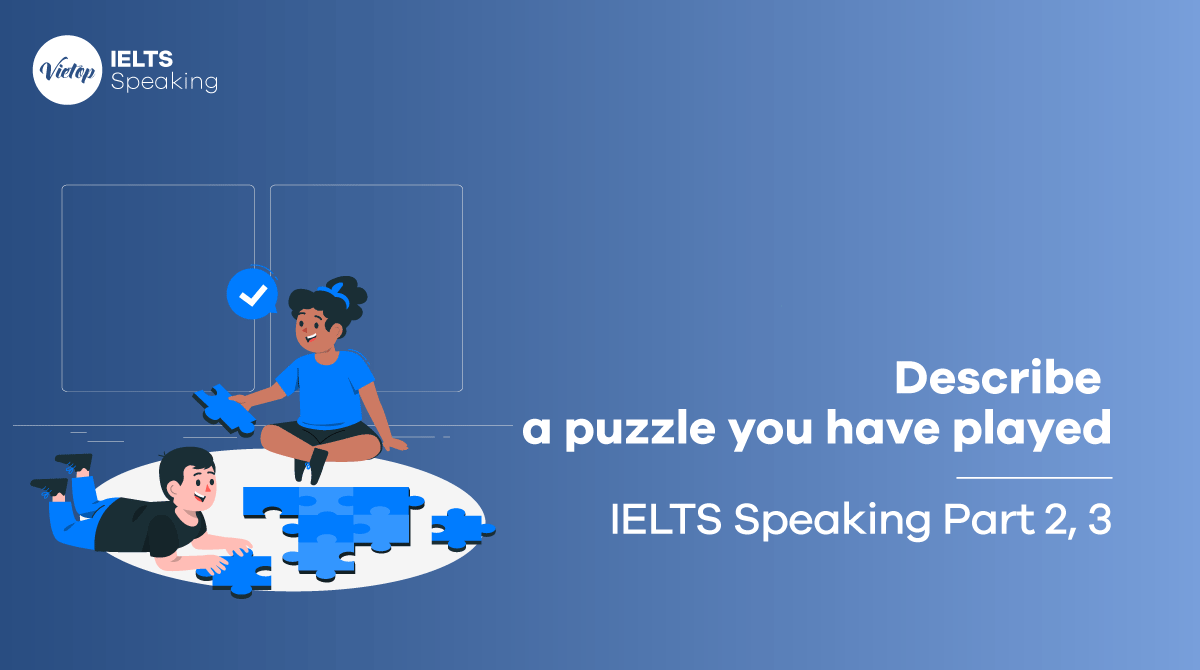Describe a puzzle you have played là một chủ đề quen thuộc trong bài thi IELTS Speaking Part 2. Tuy nhiên, để có thể trình bày một cách trôi chảy, người học cần có vốn từ vựng vững chắc liên quan đến chủ đề này. Hôm nay, Vietop sẽ cung cấp cho các bạn bài mẫu IELTS Speaking Part 2, Part 3: Describe a puzzle you have played nhé!
IELTS Speaking Part 2 Sample: Describe a puzzle you have played

Mời mọi người nghe Audio chủ đề Describe a puzzle you have played – Part 2 tại đây nhé!
Đề bài
Describe a puzzle you have played ((jigsaw, crossword, etc)
You should say:
- What is it like?
- How easy or difficult is it?
- How long does it take you to solve?
- And how do you feel about it?
IELTS Speaking Part 2 Sample
Life’s ups and downs like those of a game. There are several games and puzzles that improve our social connections and cognitive skills. I had an enlightening jigsaw puzzle experience. As a result, a jigsaw puzzle is an activity that requires a number of pieces of diverse shapes to be interlocked and placed in specific ways in order to construct or complete a figure that is displayed.
Another game that may be played both alone and with others is the jigsaw puzzle. It’s much more fun when my friends help me solve the issue. Jigsaw puzzles have been a tremendous help to me in meeting new people and forming connections with total strangers.
The brand/type and age range of the jigsaw puzzle affect the game’s level of difficulty. For instance, the jigsaw puzzle I played was difficult and took us a long time to finish even though we were a group of four. You may instead select easier jigsaw puzzles to pass the time while having fun. Typically, it takes 5 to 30 minutes to finish a jigsaw puzzle.
I’ve also always enjoyed puzzles and situations that required thinking on my feet. These interactions have helped me develop my critical and analytical thinking skills. Similar to this, solving jigsaw puzzles has enhanced my capacity to come up with rapid fixes for problems and situations.
Every time you are looking for a new game, I urge you to try a jigsaw puzzle game. You will no doubt like the mind-bending game if you keep my excellent experience in mind.
Vocabulary Highlights
- Ups and downs (idiom): thăng trầm
- Social connections (n): kết nối xã hội
- Cognitive skills (n): kỹ năng nhận thức
- Enlightening (adj): giác ngộ
- Diverse shapes: hình dạng đa dạng
- Interlock (v): lồng vào nhau
- Construct (v): xây dựng
- Tremendous (adj): to lớn
- Thinking on my feet (idiom): Khả năng phản xạ với tình huống
- Critical and analytical thinking skill: Kỹ năng tư duy phản biện và phân tích tình huống
- Come up with (v): nghĩ ra
- Mind-bending (adj): ảnh hưởng mạnh mẽ đến tâm trí
Xem thêm:
- Từ vựng chủ đề Qualifications And Experience
- IELTS Speaking Topic dancing
- Bài mẫu IELTS Speaking Part 2 topic Thing description
- Vocabulary for IELTS Speaking Part 2

Nhận tư vấn miễn phí khóa học hè
IELTS Speaking Part 3 Sample: Describe a puzzle you have played

Mời mọi người nghe Audio chủ đề Describe a puzzle you have played – Part 2 tại đây nhé!
Why do parents let their children play with puzzles?
Children’s brain activity, development, memory abilities, and other abilities are all improved by puzzle-solving difficulties. Therefore, a lot of parents allow their kids to play with puzzles. They will learn to plan, test their ideas, and ultimately sharpen their problem-solving abilities via this project. I believe that letting kids play with puzzles is preferable to letting them play on a phone.
- Brain activity (n): hoạt động của bộ não
- Development (n): sự phát triển
- Memory abilities (n): khả năng ghi nhớ
- Sharpen their problem-solving abilities: Mài giũa khả năng giải quyết vấn đề
Xem ngay: Khóa học IELTS Cấp tốc – Cam kết tăng ít nhất 0.5 – 1.0 band score SAU 1 THÁNG HỌC
What kinds of puzzles improve people’s intelligence?
The IQ score, memory capacity, concentration, vocabulary, and other skills may all be improved by solving puzzles. It is a powerful approach to keep our thoughts engaged and sharp while also exercising them. Numerous puzzles, including Crossword, Rubik’s cube, Jigsaw, Sudoku, and others, can enhance intellect and a variety of abilities.
- Memory capacity (n): khả năng ghi nhớ
- Concentration (n): sự tập trung
- Keep sb’s thoughts engaged and sharp: giữ cho tinh thần tỉnh táo và vững vàng
- Enhance intellect: nâng cao trí tuệ
Xem thêm bài mẫu Speaking chi tiết:
- Talk about your favorite sport – Bài mẫu IELTS Speaking part 1, 2, 3
- Talk about an English speaking country – Bài mẫu IELTS Speaking part 2, part 3
- Talk about your hometown – IELTS Speaking part 1, 2, 3
Why are detective stories attractive to people?
Humans, in my opinion, are generally fascinated by secrets and like solving puzzles. Detective stories are riddles in the narrative sense. Thus, when we read or hear about these occurrences, we try to infer inferences from the information given. The process is enjoyable, and the outcomes may be pretty pleasing if we get the right responses.
- Fascinated (adj): bị thu hút
- Riddles (n): câu đố
- Narrative sense: lối tường thuật
- Infer inferences: suy luận
Which do you think is better? A detective movie or its original novel?
Your reading skills and imagination may be improved through books. The movies, however, don’t give audiences much room to reflect, and a comparison to the original text in the movies doesn’t reveal much about the plot. Compared to movies, books are more in-depth and help readers develop their language abilities.
- Imagination (n): trí tưởng tượng
- Audiences (n): khán giả
- Give sb much room to V: cho ai đó không gian để làm gì
- Reflect (v): suy nghĩ lại, phản ảnh
Xem thêm:
- Describe a place in a village you visited
- Describe Your Favorite Part Of The Day
- Describe A Successful Business You Know
Which age group plays puzzles the most?
Different puzzle games are available in three difficulty levels: easy, medium, and challenging. Almost everyone enjoys solving puzzles. Due to how time-consuming the game is, adults do not have the time to play. Some people do, however, find the time to play the game. Puzzles may be played by people as old as 6-7 and 8–9 years old. Personally, I think it’s a good exercise for both kids and adults to solve puzzles.
- Available (adj): có sẵn
- Difficulty levels (n): độ khó
- Challenging (adj): khó, đầy thử thách
Hy vọng rằng qua bài viết này, bạn đã có thêm vốn từ vựng cũng như cấu trúc sử dụng cho dạng đề bài Describe a puzzle you have played. Bên cạnh về chủ đề IELTS Speaking Part 2, Part 3 Sample: Describe a puzzle you have played, bạn cũng có thể tham khảo thêm một số chủ đề khác thường hay gặp trong IELTS Speaking Part 2, Part 3. Chúc bạn chinh phục IELTS thành công!











